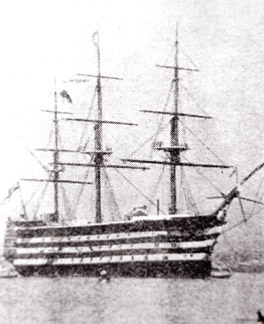Voice and ventriloquy in the Ancient Mariner

I read, studied Ancient Mariner as a teenager. The blood-sucking,
fiendish, crazy Mariner frightened me first and was the first
introduction to me of supernatural but of all the 'contexts' in English
literature (including Shakespeare's) that I studied through college,
this gusty scream of the Mariner, still rings in my ears;
'Water, water, every where
And all the boards did shrink;
Water, water every where,
Nor any drop to drink'
.. (11, 115-18)
Was Coleridge a Romantic poet? Yes, if it is so with his
contemporaries, Shelly and Keats. The canonical work of these three
along with their other colleagues of slightly different times, as that
of Wordsworth, Blake and Byron, is what is called Romantism at its
height of imagination and still later with new feeling for the natural
world.
Their demonstration has been the hallmark in poetry but it was
Wordsworth who turned around sharply and slammed at Coleridge in the
face of European phenomenon that was Romantism.
This aura gripped the literati of Britain, Germany, France, Spain and
a part of Italy and America.
 |
|
An artistís impression of the Ancient
Marinerís ship just before it was reduced to wood in the sea |
Cruel as he sounded, Wordsworth was right since as you keep
researching The Ancient Mariner, Coleridge rises from within its pages
as a fanatic: a lost soul in the brink of insanity. Each word he fed the
Mariner, came from a mind plagued with super-naturals.
His was a mixture of brilliance, It is the voice of the Mariner that
dominate, written through the medium of an alien who cries out in horror
at the speaking corpse. If it is the fragment of the word fleeing into
anonymity, then he becomes the Ancient Mariner. Why was it that the
Mariner could not name himself whose world was crowded with what he
could not own or distinguish. How true can it be that the Mariner's cry
should trope Coleridge's own standard of example synecdoche:
'The Sun came upon the left... Out of the sea came he; And he shone
bright, and on the right... Went down into the sea. Higher and higher
every day... Till over the mast at noon' Philosophy, brilliance and
materialism all wrapped into a mind of a fanatic is trapped upon the
waters from which a drop could not quench his thirst. But to assess
before and after the anticipation and fulfillment are inappropriate
where chronology of events metalepses. The scenes and same figures are
always before our eyes:
'Alas: (though I, and my heart beat loud)
How fast she neres and neres:
Are those Her sails that glance in the sun
Like restless gossameres'....
(11. 173-6)
And Coleridge when he concluded his theory of mind as essentially
creative and as a symbolic art, he was right. There was the school of
thought why the poet had to pour his iconic brilliance on a subject like
a wayward mariner, lost at sea. But he rose magnificently in what was to
become a debate even in 21st century.
For example, by crossing the boundaries of speech and character
marked by punctuation. The anonymous voice of the self propagated tale
develops into full-scale ventriloquism. The tale's character register as
a demonological one and the Mariner appears to them as a dead mas
possessed by demon spirit.
'Stunned by the loud and dreadful sound.... Why sky and ocean smote.
Like one that hath been seven days drown'd... My body lay afloat.
But, swift as dreams. Myself I found... Within the pilot's boat.
I mov'd my lips. The pilot shrieked... and fell down in a fit,
The Holy Hermit rais'd his eyes.. And pray'd where he did sit'...
(11. 583-8. 593-6)
Ventriloquisms are both fictions and realities. hen the Wedding
Guest, sensitive to the presence of linguistic demons and the voice
which had been telling him about the strange death of the crew could not
belong to the terrifying body whose glittering eyes. Have immobilized
him:
'I fear thee, Ancient Mariner:... I fear thy skinny hands.
And thou art long and lank and brown... As is the ribb'd Sea-sand:
I fear thee and thy glittering eye... And they skinny hand, so brown
Fear not, fear not. Thou wedding guest:.... This body drops not down
(11.216-23)
When Coleridge revived the poem in 1800 and changed the phrases. The
critics raised objections. Some readers were tired of antiquity and
other never had a taste for it.
Critics expressed uneasiness about the poetic regression.
Though much of the poem had the tendency to repeat which disguised
itself as balladic repetition.
Traditional balladic repetition depended for their effect either upon
their rhythmic value alone or upon their ability to unfold an irony or a
revelation.
It is apparent that Coleridge tried both in the Ancient Mariner. In
it you became what you met. The ship displays a similar vulnerability
during its transformation into an image of two things it encounters at
sea. The planks looked warped and nails seen.
How thin they are and the ship has become a skeleton ship. Though it
does not plunge in the water like the spectre ship, moves without a
breeze. The tide is powered by supernatural forces. The Mariner becomes
violent but there is noting he could do but be at the mercy of the
'salt' water.
'But soon there breath'd a wind on me.. Ne sound ne motion made.
Its path was not upon the sea... In ripple or in shade
Swiftly, swiftly flew the ship... Yet she sail'd softly too
Sweetly, sweetly blew the breeze.. On me alone it blew'
(11. 457-60)
The appearance of the spectre ship, an emblem of what he is about to
become, inspire the Mariner to invent a rash act and free his speech
from the bonds of thirst.
'I bit my arm and suck'd the blood... And cried, A sail: a sail'...
(11.152-3) |



